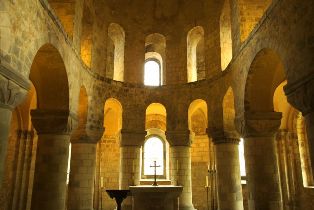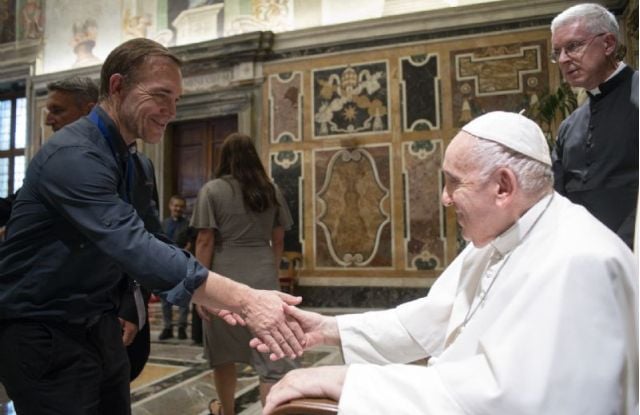

5 Temptations of a pastor
The job of pastor is hard enough. Ephesians 4 describes the role of pastor in the context of four other roles so that he can shoulder the weight of leadership with others. Unfortunately, however, our modern pastor/teacher role is unbiblical.
Now, that may sound outrageous, particularly to those blog readers who are pastors. Let me explain: What I mean is that nowhere in scripture are pastors asked to go to seminary, preach a weekly sermon and lead a flock of believers the way they do today (for a good book on this, read Frank Viola’s New Wineskins – if you disagree, show me different in Scripture). And because the role as it is practiced is unbiblical, pastors everywhere are set up for failure and are bombarded by temptations that help them to cope.
Here are five temptations that have corrupted our practice of church.
 Temptation #1: To steward the Institution, not the people
Temptation #1: To steward the Institution, not the people
It’s easy to mistake the institution for the thing itself. The Institution pays our bills and offers us security and even an identity, but it can’t give us life. The Institution emphasizes form over function, buildings over ministry, payrolls and job descriptions over people, process over purpose, ritual over relationship and finally, safety over sending.
Temptation #2: To skim the surface rather than model transparency
We need to get in touch with our brokenness. We need to model vulnerability. Churches need to learn from AA groups: “My name is Seth Barnes and I’m a sinner. Here’s how I’ve struggled this past week.” It’s human and normal to struggle. We need to stop teaching so many biblical principles that have no relevance to people’s every day reality and just get real. We need to let our humanity show. Embarrassment is a good thing.
Temptation #3: To prioritize teaching over intimacy & outreach
We leaders love to teach. I enjoy preparing for talks I give. But teaching is just one gift among many and teaching is safe. It can be done in the safe confines of four walls. It doesn’t require getting messy. Jesus taught, but his primary impact was thru touching. It was his intimacy and outreach that made a difference.
Temptation #4: To allow “weaker brothers” to define freedom & grace
How did this practice of abundant life that Jesus described, this religion based on grace, get held hostage to a list of rules and regulations? Most of us prefer simplicity to complexity. “Just show me what to do and I’ll do it.” Jesus gave us the Holy Spirit as our counselor and freed us to truly live. Yes, the book of Romans gives us the wages of sin, but it also gives us the balance of practicing our freedom.
Temptation #5: To confuse “the faith” with faith
I don’t know how it is that faith has fallen on hard times. Perhaps it’s because we don’t really need God for anything. In Africa when they pray “give us this day our daily bread,” they really mean it. We came upon a small hut in Swaziland. Inside was a 14 year-old orphan responsible for a younger brother and sisters. Their parents were dead. When they prayed for their daily bread, they did so earnestly. And when their daily bread arrived unexpectedly at the door, they danced for joy. God provided. God rewarded their faith. When was the last time you practiced faith like that?



A GREAT BLOG and I will add my prayers to it for it to stir pastors to honestly consider what you’ve put out here. We read Viola’s book (and other resources) some years back and the unbiblical model of the way “church” is done has been wonderfully and grievously clear ever since. I believe the prayer for often sincere, hard-working pastors is for the passion for Jesus and seeing Him formed in others is greater than the need for security and identity. There’s a price to pay, but WHICH price will be paid? As you said yesterday, Seth, faith means RISK (from a human point of view). But we also know that faith and obedience brings FREEDOM and lasting fruit.
GOOD Word Seth, I’m not sure, to be perfectly honest that I’ve ever had to stretch myself into a faith such as these kids, praying for a meal to sustain life. We are a spoiled people and a blessed one at the same time.
Seth, please go ahead and break these 5 points down. You seem to have said so much in few words here. Though I’m in Africa, we have great challenges in all the areas you’ve touched and even more )of course you know that too well).
Currently, the “gospel of Prosperity” as it’s called is selling here in Nigeria and why not, with the poverty all over the place. So the quest to be delivered from need and lack has found a place in the teachings in 98% of the churches here. The accompanying issues with this perspective to life and ministry is unimaginable. With pastors striving to ride the latest cars in town, wear designer clothes, gold chains and rings etc… we have a GREAT PROBLEM!!
Thanks for this blog. Though I could loose some pastor friends when I forward this to them. Please pray it will be well received as to produce the right results. The TRUTH alone makes free.
I am so grateful for this blog and it spoke so truly to my heart. It can be very difficult to experience genuine brokenness in the type of setting you are describing that exists in our American churches. I am very grateful for our freedom of religion but too often its taken to make us comfortable. If Paul called himself the worst, who lived a life completely sold out to live for Christ alone, then who are we to think any more of ourselves? Why does the building budget come before the mission budget? These are thoughts that make my heart ache everyday. So what do those do who are seriously hungering and thirsty for righteousness and are being taught other things?
This was very encouraging and is causing me to think about the ministries that I am involved in and how I am serving. I especially enjoyed this line: “Jesus taught, but his primary impact was thru touching.”
Regarding the introduction of this post, the New Testament does not spell out MUCH regarding the typical structure of a local group of believers. Sure, you have Paul CORRECTING issues and SOMETIMES saying “this is for all the churches” but for the most part it is very loose. I mean, Paul doesn’t even make a huge stink about the fact that the Corinthians were baptizing people in place of the dead who were not baptized (1 Cor 15)!
To say the way we do it is “wrong” is to say the New Testament lays out a perfect ecclesiastical structure. Or that it says have nothing to do with structure (even though Paul appoints overseers etc). By the second century you have a sort of structure, but it has been understood by necessity of keeping the Movement live.
I think the second century church were not a bunch of sell-out… I mean it is said that Onesimus (from the Philemon letter) succeeded Timothy has bishop in Ephesus. Onesimus was converted by Paul, maybe mentored (I don’t know) so I would guess he knew something of the true Christian faith and yet became a bishop.
1. Buildings etc. aren’t the problem. The people are. If people want a place to meet, fine. If they want to build a structure that will be a haven for people without a place to go. Good. If these people are not untwisting what has been broken and depraved in this world… feeding hungry people, literally, and forming new community with all socio-economic and racial classes, then they aren’t Jesus’ followers anyway. Or at least they MIGHT be surprised at the separation of sheep from goats.
2. Thankfully, from what I have seen, brokenness is “in”. Pastors who seem unaccessible or “above” people (weird since they should model the Lord’s actions and be servants of God’s servants) are not listened to anymore.
3. True teaching must involve action. I won’t pull methodology from what Jesus did but throughout history, nothing sticks without getting your body in the stuff.
4. True teaching liberates people. Muddled theology generally brings about bondage. If not to false requirements of God, then expectations of other believers or local groups of believers.
5. What is THE FAITH? There is so much tossed around by so many parties nobody knows what that means. People may even have faith but do not know what they have faith IN. Of course, some faith, with the smallest nugget of truth, will change the world. Only knowing that God is good and that having faith in Jesus’ name opens the floodgates of heaven is enough for people to be healed and fed. But what of the power when we know what the true Christian Hope and Vocation is? Faith mixed with that is what caused the explosion in the 1st Century. Again I concede faith is more important than THE FAITH because bits and pieces of THE FAITH are around to put faith into. But they are meant to be married.
As always, your writing challenges me to the point where I’m half afraid of you half the time. I never finished New Wineskins. I was so defensive after the first chapter that I chunked it. Maybe it’s seminary talking, but I think there’s a difference between prescriptive and descriptive in scripture and much of what Viola cites in regard to the church in Acts seems to me as more descriptive (describing what was, not necessarily what should be).
I certainly won’t argue that the church in America is in trouble. Nor would I argue about those 5 very real tempations. No doubt some of The World Racers are drawn to the World Race out of discontent with their home “church”. I bet more of them are here because they “got it” in their home church. I see most of them as products of what is good with church back home. I’m not ready to throw the baby out with the bathwater.